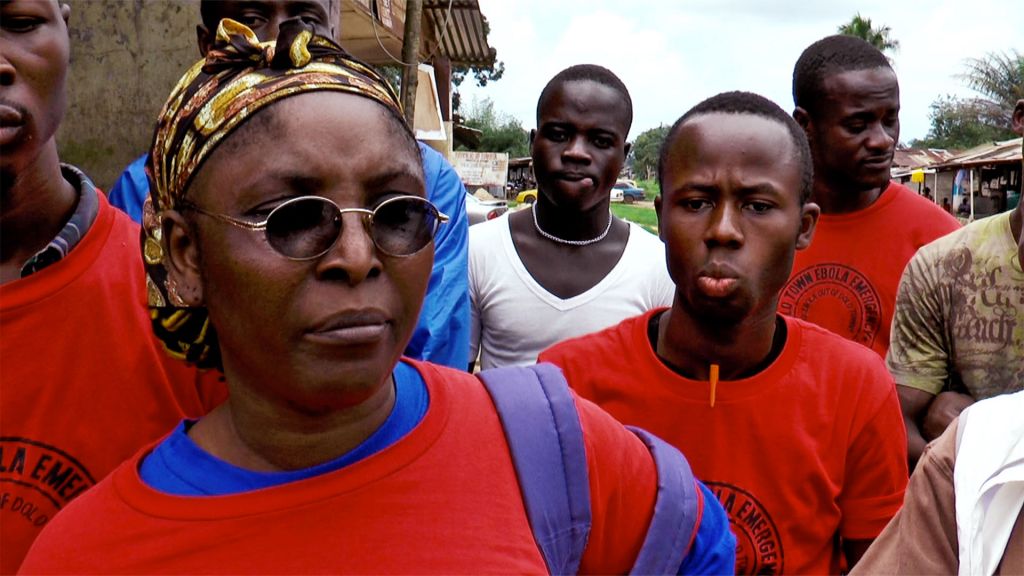Independent Lens presents the premiere online of In the Shadow of Ebola [watch now], a gripping short film set around the height of the Ebola crisis, but told from a highly personal point of view. The documentary by Gregg Mitman and Sarita Siegel is the story of Emmanuel Urey, a Liberian going to school in Wisconsin but who was in Monrovia with some of his children when the Ebola virus broke out. The film is both an intimate portrait of a family in the center of a terrifying crisis, but also a fascinating look at how a country in the aftermath of a long civil war handled a major health scare.
Now, a year after the events depicted in the film, find out where life has taken the Ureys, the status of Ebola across western Africa, and the new project filmmakers Mitman and Siegel are wrapping in Liberia.

Emmanuel Urey
More on Emmanuel Urey: An Update
We emailed with Emmanuel this past week and got an update on how he and his family have been doing since the film left off. Here’s what Emmanuel had to say:
Right now all the boys along with my wife are back in Madison with me except my eldest son Bobby, who is still in Liberia with grandmom. Joseph, Lloyd (Nelly) and little Emmanuel are doing very well in Madison. Joseph was promoted to 8th grade while Lloyd passed to the 3rd grade. Emmanuel is continuing daycare. Currently Vivian works with the Central Wisconsin Center and she is anticipating going to the Madison Area Technical College to pursue a nursing degree.
Although I lost several friends to Ebola, the one that was closest to my heart was E. Malikee B. Siryon, a medical student at the AM Dogliotti School of Medicine. Malikee and I attended Cuttington University together with the hope of going to medical school. I later changed my mind to pursue a Master’s in Public Health while Malikee continued pursuing his dream of becoming a medical doctor. But the nightmare of the Ebola virus cut his dream short. May his soul rest in peace.
I will be traveling to Liberia in early August to visit Bobby and the rest of my family, while furthering my PhD research on land tenure and rural livelihood in Liberia. Even though the World Health Organization has declared Liberia Ebola-free, I continue to worry about Sierra Leone and Guinea. We cannot fully celebrate [as] these two neighboring countries continue to harbor the Ebola virus. Our cultures are fluid, and people move readily across the political borders, separating these three neighboring countries in West Africa, which contributed to the rapid spread of the virus.
At the time of my departure last year, the entire nation was in chaos. I look forward to reuniting with friends and family, especially in Gormue, my home village on the Liberia/Guinea border.
Ebola Updates
According to Medecins sans Frontieres, as of May the outbreak was at its lowest, but not over yet: “[t]he recent weeks have seen an important decrease in new confirmed Ebola cases across West Africa. Liberia is now close to being declared Ebola-free on 9 May, while Sierra Leone and Guinea are finally getting close to zero. However, the outbreak is not over until it’s over at the regional level. No country can really be thought to be Ebola-free until all three countries in the outbreak have no recorded cases for 42 days.” And in the aftermath, according to MSF, already weak public health systems have been seriously damaged by the epidemic, and “many survivors keep facing unfair exclusion and stigma in their own communities.”
All Ebola cases in America and Europe were health and aid workers who contracted Ebola in West Africa and were transported back to their home countries for treatment. In the United States, despite much panic domestically and from mainstream media, no one actually contracted and died of the disease within the United States. There were, however, four lab-confirmed cases with seven more reported; one patient, a Liberian national visiting the United States, passed away. More recently, an American health worker in Sierra Leone, Africa, contracted the disease. Africa is not out of the woods, though clearly the very worst seems to be over.
Update (6/30): Sadly, we get word (via FrontPageAfrica news) that a new case of Ebola was reported in Liberia this month, resulting in the death of a 17-year-old boy. But authorities there are hopeful it’s an isolated incident.
Filmmaker Gregg Mitman
More on the Filmmakers
Gregg Mitman, who is based at the University of Wisconsin-Madison (along with Emmanuel Urey), has extensively studied biomedical research in Liberia, and his informed perspective on the Ebola crisis has appeared in the New England Journal of Medicine and on public radio. He is founder and director of Madison’s environmental film festival, Tales from Planet Earth, and has taught environmental film production.
Gregg recently attended the Australian premiere of In the Shadow of Ebola, and will soon travel to the Centers for Disease Control and Prevention in Atlanta, where the film is being screened as part of the CDC’s training program for incoming Epidemic Intelligence Service officers. Gregg will return to Liberia next to complete the shooting of A Film Never Made and to help the Center for National Documents and Records Agency in Monrovia to launch a new public history website that will provide access to the earliest known motion picture record of Liberia’s past to survive the civil war.
Filmmaker Sarita Siegel
Director Sarita Siegel has begun editing the aforementioned one-hour film they were making when Ebola appeared on the horizon, A Film Never Made, which is set in Liberia. Her film company Alchemy Films is also in production on Outspoken, a feature documentary that journeys around the world to highlight the growing wave of rap artists who use lyrical dexterity and the power of the microphone to influence the political landscape.
